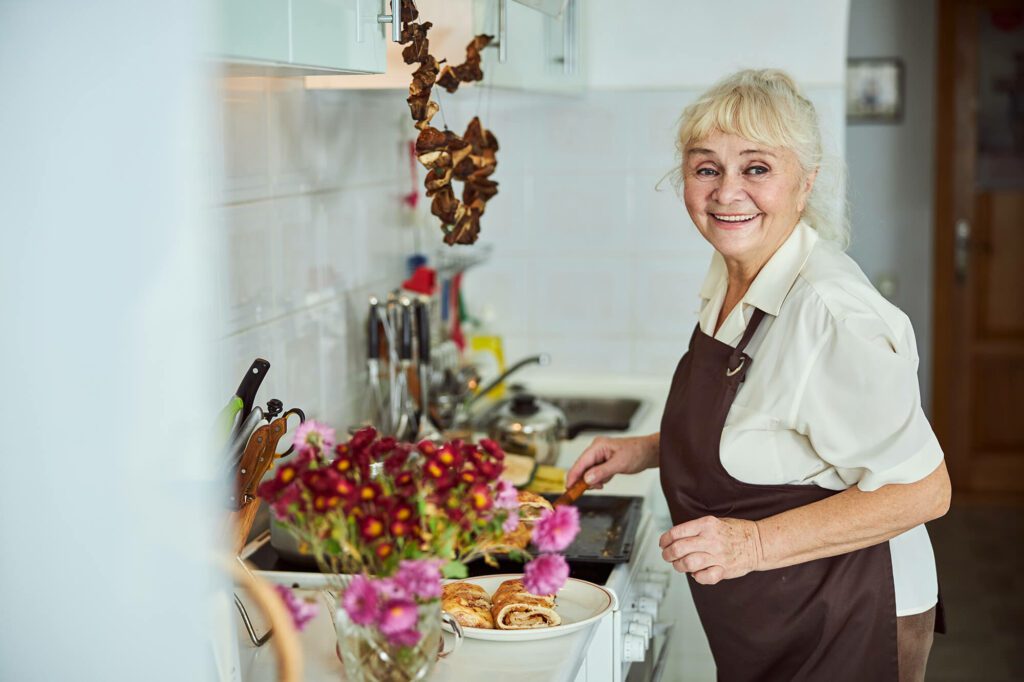Why do older adults resist care? A guide to speaking with a loved one about home care

Why do older adults resist care?
Older adults may resist care for a variety of reasons that are both personal and specific to their circumstances. It is important to consider the individual’s unique needs and preferences. Specific psychological and emotional barriers can include the following:
1. Fear of losing control and independence
This, along with pride, can be a barrier, especially for those who have been living independently for some time. They may worry about how they could be perceived by others if they were to accept care. They may be concerned about other people’s perceptions if they were to receive care.
2. Sense of self/self-image
A person’s identity and sense of self are formed over many years of life experiences. As they age, these experiences can conflict with their current care and support needs.
3. Anger
Depending on the reason why they now need support, they may feel angry that they can no longer complete tasks they were once able to.
4. Mistrust
This can be especially true for individuals who have had previous bad experiences with care, or if they’ve heard from friends or family about their negative care stories.
5. Lack of insight or understanding
This may be true for individuals who have memory impairment or dementia; they may know that something is “not quite right” but do not have a full understanding of how it may be impacting their quality of life.
6. Family support expectations or fear of disconnection
They may expect their family to provide support or fear that accepting outside care will lead to a loss of connection with family members.
7. Financial worries and lack of information
Concerns about the cost of care may be a source of resistance, as well as the inability to visualise what care could look like, due to lack of information.
Involving your loved ones in the care process
How and when you broach the subject of care is crucial. If possible, create a relaxed and comfortable environment for the discussion. While honesty and openness are important, empathy and active listening are equally vital.
Remember that people may refuse care if they feel they are being “told what to do” instead of being included in the conversation and decision-making process.
Involve your loved one early in the decision-making process about their care. Ensure they’re included in every step, from defining what support entails to choosing their caregivers. By providing the necessary information, they can make informed decisions about their care.
Actionable Tips
- Environment matters – minimise distractions, privacy, and a familiar place.
- An objective third party or respected person, like a doctor, solicitor, religious leader, friend or relative can help.
- Try and avoid your loved one feeling ambushed. Throwing everything at them at once can cause stress or anxiety.
- You know your loved one best – what is best? It could be a casual conversation or something more scheduled and structured.
- Find an opportunity to introduce and trial care, like a holiday booked, a work trip, or a time when you may not be able to provide such intensive support. You can use this as a transition point or an opportunity to open the door to the conversation.
- Piggyback on a more natural conversation like a lasting power of attorney or future planning.
- Discussions about what a loved one sees or feels versus what you see or feel can help establish common ground. You can start by asking what’s most important to them and where they would like to see improvements in their life.
- Consider the language used, like “care” versus the words “help” and “support”. Are you very focused on what they “can’t” do versus using enabling language? The term “care” can carry negative connotations associated with a loss of privacy, dignity, and independence, which can be a barrier for older adults who have been living independently for some time.
- Stress the realities of the situation – what are likely consequences of care not being implemented?
- Lean on the idea of a trial period and the ultimate flexibility – nothing is set in stone forever and completely irreversible.
- Choose a next step, like research or a follow-up conversation once they’ve had time to take in the information you’ve provided them with.

Home care as an enabler
Home care can be a significant enabler for older adults when it’s truly centred on the unique history, preferences, and needs of the individual receiving care. Whether live-in or visiting — care should empower the care receiver to maintain control over their environment and their day-to-day activities.
Personalised support and promoting independence
The assistance provided, no matter what the task, should maximize what your loved one can do and provide supplementation for what they find more challenging, or even unenjoyable.
For example, if someone loves cooking but struggles with arthritis, a carer could support them by opening packaging and chopping. Ultimately, the care recipient is driving the process, like choosing the meals, and recipes, and doing all they can such as mixing, spicing and cooking more generally.
Another example is someone who requires assistance with personal care. Perhaps they need assistance to set up a safe environment. Adaptations to a bathroom can be made to maintain independence in the bath or shower, with someone on hand nearby in the event of an emergency.
Choice and autonomy
By involving the older adult in the decision-making process about their care, preferences, and routines, home care promotes a sense of control. For example, the care recipient chooses what time of day to do certain activities even if it seems unconventional.
It’s important to respect their adulthood, even if we don’t always agree with the decisions being made. A professional carer is there to support your loved one’s needs and preferences as long as no one is being put at risk of harm.
Socialisation and connection
Care should not only be focused on assisting with physical tasks. It can also offer companionship and access to the community, which helps prevent isolation — a common issue for older adults. Support should also include access to hobbies and interests that make the care recipient feel like themselves, and encouragement to explore new interests and undiscovered talents. This connection and exploration can promote mental well-being and reduce the feeling that their life is being “taken over.” Mastering a new skill also provides a sense of accomplishment and self-worth.
Examples of socialisation and connection include escorting care recipients to activities, clubs, and social outings, and facilitating activities at home if an individual is unable to access the community. Sometimes, care recipients don’t want to be seen in public with their carer. In these instances, it’s important to talk to the carer about what to wear and how to position themselves.
Safety and peace of mind
Home care should offer peace of mind to both the older adult and their family members. Knowing that someone is there to help in case of an emergency or to provide support in daily activities can allow the older adult to feel secure while still being able to live in their own home.
It’s common to hear remarks from older adults like “I don’t want to be a burden”. If appropriate, you can channel the narrative to position the carer as the person who can alleviate these worries.
Actionable tips
Think about the technology that can supplement the formal care arrangement, like sensors, alarms, trackers and medication dispensers. This can give your loved one a continued sense of autonomy and allow for the professional carer to focus on other areas of care and also ease into the arrangements.
Think about ‘no tech’ or low tech solutions. One example of a no tech solution is the Herbert Protocol, a national scheme that encourages carers, family and friends to provide and put together useful information, which can then be used in the event of a vulnerable or older person going missing. Another example includes simple signage around the home or easy modifications to the home environment.
Low tech solutions include things such as orientation clocks, and automatic sensor lights in high risk areas such as bedrooms and bathrooms. Sensor lights should be gradual and gentle lighting so as not to startle or disrupt vision.
Establishing trust and safety
Once you have opened the door to the idea of care at home, how do you make this idea stick? People often fear and resist what they don’t understand.
To ensure the highest quality of care, all carers using Elder must:
- Have an up-to-date DBS/PVG
- Have the right to work in the UK
- Provide proof of address
- Complete reference checking
- Pass an initial face-to-face interview.
We also collect feedback from families who have used carers on our platform, and we have a stringent Q&A process where a carer receives constructive feedback.
We suggest that families review a carer’s profile, schedule a time to speak, and arrange a video meeting (and include your loved one where possible). It’s important to establish you and your loved one’s non-negotiables. We also recommend having questions prepared to find out more about a carer’s experiences, skills and values, and think about how these align with your needs and the needs of a loved one.
At Elder, we have established the following guide to support the hiring and engagement process with carers on our platform.
Clear communication of expectations
It’s important to establish a detailed care profile on the MyElder App that outlines your loved one’s needs, preferences, routines, and any medical conditions. Honest and clear guidelines help both the carer and the older adult feel more comfortable. Discuss clear boundaries and personal preferences, including how much assistance is needed with daily tasks, privacy concerns, and any cultural or personal beliefs that should be respected.
Regularly communicate with the carer to ensure their approach aligns with your care expectations. It’s important to check in often, especially in the beginning, to see how things are progressing. At Elder, we provide an in-product chat function, or you can choose to exchange numbers and communicate via WhatsApp or text message.
Gradually introducing a carer
You can look to start with a trial care period to see how a carer interacts with your loved one, and importantly, how they feel about their carer. For the older adult, a gradual introduction to the carer can make the transition smoother and can allow them to build trust and rapport. You can start with shorter visits and work your way up to short-term or permanent care.
Ongoing monitoring and check-ins
Conducting regular visits or phone calls gives you peace of mind that your care expectations are being met. Observe how a carer interacts with your loved one during visits. Look for signs of respect, attentiveness, and professionalism.
At Elder, we have established CareLogs where a carer can note down what they have done for the day. This gets sent to the primary customer on the account. This is a semi-structured form, but families are encouraged to do what works best for them as information tends to evolve. We also provide an incident reporting tool for carers to raise any incidents or concerns which go directly to the primary account holder.
Feedback and open communication
Encourage the older adults to share how they feel about the care they’re receiving. If any concerns arise, whether related to safety or trust, address them promptly and professionally. At Elder, any concerns regarding the quality of care are escalated to our Clinical Team for review and support.
Safety precautions
We recommend organising clinical/medical assessments before or concurrently with care. Occupational therapy, physiotherapy and speech and language therapy can help ensure the home environment is prepared and safe for a loved one.
Establish a clear emergency plan with your carer, including procedures for medical emergencies, falls, or other accidents. Ensure the carer is familiar with the individual’s medical history, medication or other relevant professionals and has that information on hand. You can write an emergency contact form and keep it in a visible and accessible place in the home, like the fridge.
Building a positive relationship
If your loved one enjoys certain activities or hobbies, involving the carer in these activities can help build rapport and make the experience more personal and engaging.
Make sure the carer focuses on relationship building and not only on the tasks that need doing. This also means being flexible – perhaps the laundry didn’t get done this week but the carer took your loved one to a series of enjoyable activities or spent more time bonding. Keeping expectations realistic and focusing on what matters to your loved one will go a long way – this being said, perhaps doing the laundry is what matters to you or your loved one.
Final Thoughts
Home care should be a supportive and empowering experience that enhances the well-being of the older adult while preserving family relationships. By focusing on clear communication, trust-building, and personalisation, home care can be a valuable enabler of independence and quality of life.
Taking a proactive, empathetic approach to introducing care will make the transition smoother for everyone involved. Whether starting with occasional support or full-time assistance, the key is to ensure care is centred around dignity, autonomy, and the individual’s unique needs.
If you’d like to speak about care at home for a loved one, Elder is here to help.





